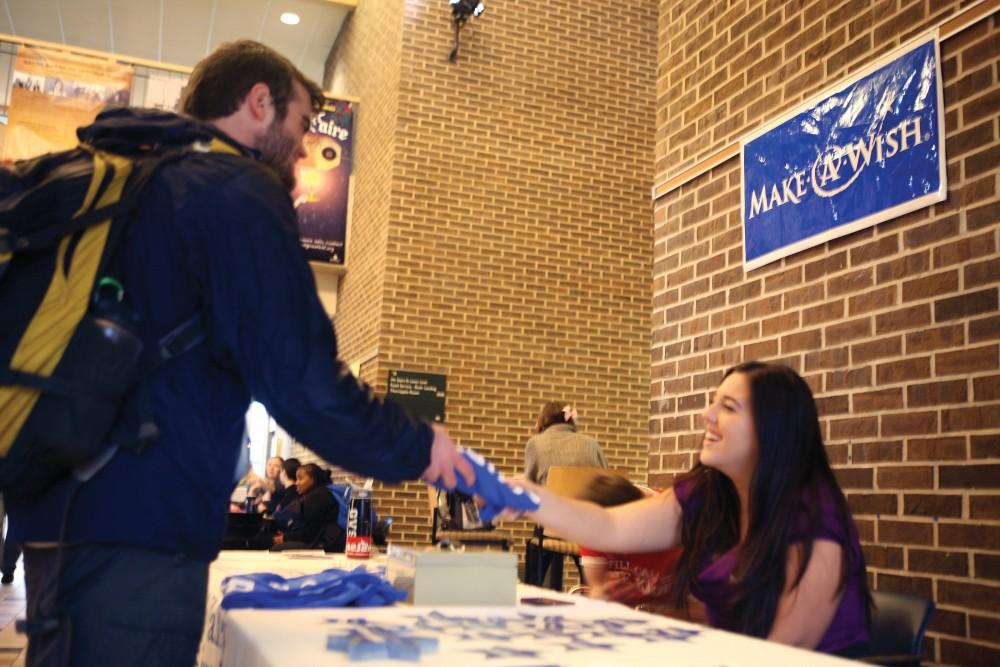Student organizations funding process

GVL / Archive Stephanie Ewart hands a student their Battle of the Valleys T-Shirt during a past year.
Nov 25, 2012
The Grand Valley State University Student Senate receives many funding requests from organizations throughout the year, and its finance committee helps decide whether to approve or deny these requests.
“Student Senate hears requests mainly for on-campus programming and educational or conference travel,” said Stephanie Ewart, vice president of the finance committee. “The vast majority is for on-campus programming from the 360 organizations on campus. Events such as Relay for Life, Leadership Summit and Rock Against Rape are partially funded through the Student Life Fund. Most organizations on campus utilize the Student Life Fund at some point.”
The Student Life Fund began with about $1.2 million this year, which was allocated by the Board of Trustees and other members of the University Budget Committee. “The Student Senate Finance Committee spends several months budgeting the Student Life Fund appropriately to ensure that each group gets the money they need,” said Jeffrey Pelc, a member of the finance committee.
Ewart added that the money is allocated based on both merit and need as perceived from previous years.
“The lump sum of $1.2 million is decided upon between faculty and administrators,” Ewart said. “From there, the 1.2 is broken down in a budget created by the Student Senate Finance Committee and approved by the general assembly. The budget is planned with input from students, staff and faculty and takes close to two months to plan.”
Each senator on the finance committee chairs one of 13 funding boards on campus that include a variety of students from different organizations. The boards hear requests and the senate member that chairs the board is advised by the director of Student Life.
“The senators provide counsel and proper procedure but the board members are responsible for making the decision about whether to approve or deny requests,” Ewart said. “Senators do not have a vote.”
Organizations in good standing with the Office of Student Life are eligible to make a funding request. Once a request is made, a funding meeting is scheduled for the organization to answer questions about the details of the request. If it clearly benefits campus, it will be approved.
“The one thing that always has to happen is the program has to benefit Grand Valley’s campus and be open to all students,” said Samantha Conrad of the Senate Finance Committee.
Only requests that are over $10,000 get voted on in the Student Senate general assembly, and Ewart said those only come two or three times per academic year. The funding boards approve about 90 percent of requests. Ewart said the ones that aren’t approved are usually rejected because they do not follow internal funding rules or don’t benefit campus as a whole.
“The number one priority of students and senators is to understand how events will benefit campus overall,” Ewart said. “If an organization is present on campus and puts forth effort in fundraising and programming, we will more than likely approve funding.”
Conrad said she is impressed by GVSU’s method for funding student organizations.
“It is not very often you see students supporting other students’ needs and working together,” Conrad said. “The funding board process has worked well, and it really gives every group a chance to be heard. Our process is definitely not flawless, but really has improved each year, and I am glad with the way we do things because it truly benefits all.”
And in the end, that’s the point of the funds: To support student life on campus.
“We want to do everything in our power to make sure campus events are able to be held,” Ewart said. “The students of Grand Valley are passionate and we want to do what we can to fund these passions and make relevant campus programming.”






















